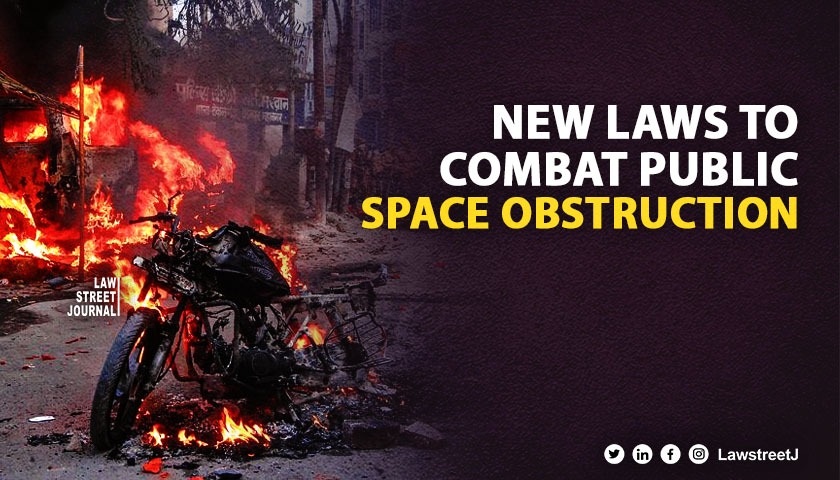NEW DELHI: The Law Commission of India has recommended for a enacting separate law or making necessary amendments in the Bharatiya Nyaya Sanhita or the Indian Penal Code to deal with the issue of prolonged wilful obstruction of public spaces.
It felt that criminal cases relating to the offences under the Prevention of Damage to Public Property Act may not act as a sufficient deterrence.
The Comission opined that those who are involved in damaging public property may get bail only after depositing money equivalent to the loss caused by them.
It also noted prolonged obstructions of public spaces often end up causing huge inconvenience to the smooth movement of even essential and emergency services such as availing of medical facilities, mobility of ambulance and fire brigade, efficient discharge of administrative and judicial functions, schools, colleges, etc.
Wherever, such protests are not in designated places and tend to create wilful obstruction and blockade of public spaces and roads for prolonged periods, a comprehensive law should be put in place to address them so that they cannot get ignored and continue to cause tremendous hardships to the general public in the guise of absence of legislation, the commission said.
The panel led by former Karnataka High Court Chief Justice Ritu Raj Awasthi, in a report submitted to the Law Minister Arjun Ram Meghwal, said, Compelling the offenders to deposit the estimated value of the public property as a condition for granting bail would definitely be a sufficient deterrent against destruction of public property".
The panel felt that the fear of conviction and sentence in criminal cases relating to the offences under the Prevention of Damage to Public Property Act may not act as a sufficient deterrence against destruction of public property.
In order to address the issue of damage to private property, a separate law can be brought in such as the Kerala Prevention of Damage to Private Property and Payment of Compensation Act, 2019 enacted in the State of Kerala. The same can also be achieved by amending and adding to the applicable sections of IPC or the Bharatiya Nyaya Sanhita, the Commission said.
In its 284th report, the Commission said over the years, the destruction of public property has continued undiminished and, in fact, it appears that the scale of destruction has only increased over the years causing gargantuan losses to the public exchequer and inconvenience to the general public.
It said the law that was passed in 1984 seems to have failed in its stated objective of preventing the destruction of public property, and this is a sentiment echoed not only by the courts but also by various other government bodies.
The Commission also pointed out that in Kerala, as a result of the decisions of the Kerala High Court in Hemanth Kumar Vs Sub Inspector of Police and, Hemachandran M T @ Kamalesh Vs Sub Inspector of Police, the criminal courts insisted on depositing the estimated value of the public property damaged as a condition for granting bail.
As a result of this, instances of destruction of public property in connection with bandhs, hartals and other public agitations have become practically nil, the panel said.
Bearing in mind the gravity of the issue and the loss being borne by the state exchequer, the 22nd Law Commission suo motu undertook to prepare this report.
The Commission made an extensive study of the subject, analysing the various relevant constitutional and statutory provisions, the numerous judicial pronouncements by the courts across the country, and the incidents involving large scale destruction of public property.
After an in-depth deliberations, the Commission recommended amendments in the Prevention of Damage to Public Property Act (PDPPA), 1984.







![SC Issues Notice to Centre on PIL by Ashwini Upadhyay to Debar Candidates From Contesting Polls on Framing of Charges [Read Petition]](/secure/uploads/2022/09/lj_1437_005ca7f1-c09c-4f29-8382-e746aa4dd230.jpg)
![Amicus curiae supports plea for permanent disqualification of convicted lawmakers [Read Report]](/secure/uploads/2023/09/lj_2142_39a30518-7616-4c47-8f64-5f81898860ae.jpg)
![Supreme Court Frees Death Row Convicts Due to Flawed Investigation in 2013 Kidnap Murder Case [Read Judgment]](/secure/uploads/2023/09/lj_8975_1adddeb4-b0a7-46df-a9cc-4af7ecac44ec.jpg)
![Law Commission Recommends Judicial Discretion for Age of Consent Under POCSO Act [Read Law Commission Report]](/secure/uploads/2023/09/lj_9734_4840497d-8532-493f-9599-f929c6a45bd4.jpg)






